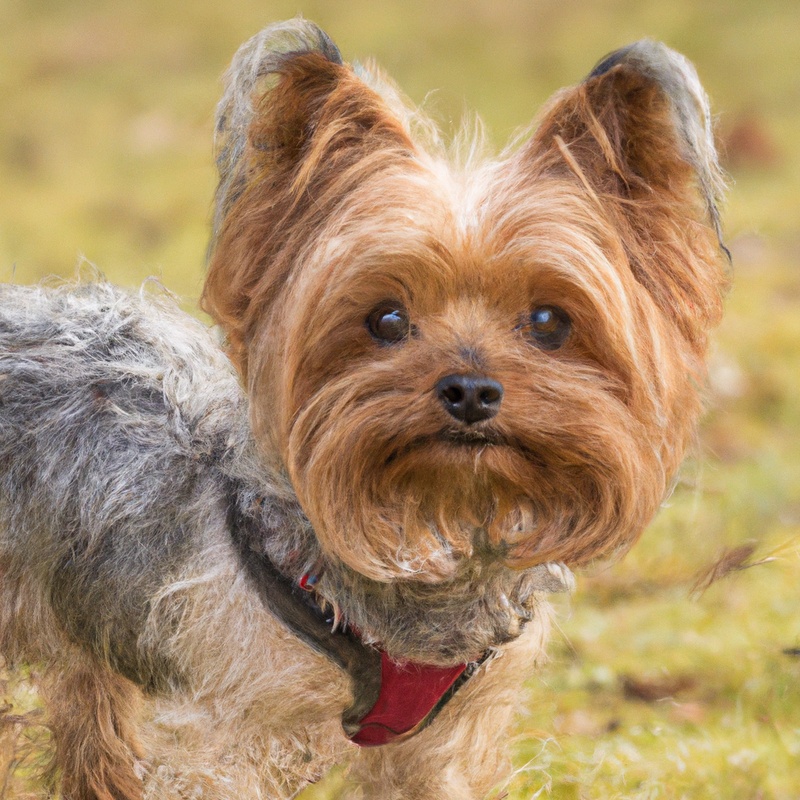How Do I Prevent My Yorkshire Terrier From Barking At Other Dogs On Walks?
Key Takeaways:
- Train your Yorkshire Terrier to focus on you during walks to minimize their reaction to other dogs.
- Socialize your Yorkshire Terrier early on to improve their behavior around other dogs.
- Use positive reinforcement techniques to reward your Yorkshire Terrier for calm behavior during walks.
- Consult with a professional dog trainer if the barking behavior persists and becomes unmanageable.
Do you find yourself dreading walks with your Yorkshire Terrier because they turn into a barking frenzy whenever they see another dog? Trust me, you’re not alone.
As a dog enthusiast and experienced trainer, I’ve seen many Yorkshire Terriers struggle with this issue.
But fear not! In this article, we’ll dive deep into understanding why Yorkies bark at other dogs and explore practical steps you can take to prevent this behavior. From proper leash training techniques to harnesses designed to discourage pulling, we’ve got you covered.
Let’s put an end to the barking madness and make walks enjoyable again for you and your furry companion!
| Possible Solutions | Pros | Cons |
| Positive reinforcement training | – Encourages desired behavior – Builds trust and obedience | – Requires time and consistency – May not work for all dogs |
| Distraction techniques | – Diverts attention away from other dogs – May reduce anxiety and barking | – Temporary solution – Dog may become desensitized |
| Socialization | – Helps dogs become more comfortable around other dogs | – Requires gradual introduction – May take time to see results |
| Muzzle or leash | – Provides control and safety – Prevents barking and biting | – Restricts natural behaviors – May cause discomfort or stress |
Understanding why Yorkshire Terriers bark at other dogs
The territorial nature of Yorkshire Terriers
Yorkshire Terriers have a naturally territorial nature. They are bred to be alert and protective, which can lead to them barking at other dogs.
This behavior is their way of asserting themselves and defending their territory.
It’s important to understand that this behavior is instinctual for Yorkshire Terriers and not something that can be completely eliminated. However, you can help manage their territorial behavior by providing proper socialization and training.

Fear or anxiety-based barking in Yorkshire Terriers
Fear or anxiety-based barking in Yorkshire Terriers is a common issue that many owners face. These little dogs may bark at other dogs out of fear or nervousness.
It’s important to understand that this behavior is often a result of their natural protective instincts and can be managed with proper training and patience.
To address fear or anxiety-based barking in Yorkshire Terriers, it is crucial to create a positive and safe environment for them. Slowly introduce them to new dogs and situations, reward calm behavior, and use positive reinforcement techniques.
With consistency and understanding, you can help your Yorkshire Terrier overcome their fear and reduce their barking.

Lack of socialization as a reason for barking
Lack of socialization can be a reason why Yorkshire Terriers bark at other dogs. When a Yorkie hasn’t been properly socialized, they may react with fear or aggression when encountering unfamiliar dogs.
Socialization involves exposing your Yorkie to different dogs, people, and environments from a young age, which helps them feel more comfortable and confident.
It’s important to gradually introduce your Yorkie to new experiences and use positive reinforcement to encourage calm behavior around other dogs. Remember, socialization is an ongoing process, so continue to expose your Yorkie to new situations throughout their life.
Steps to prevent your Yorkshire Terrier from barking at other dogs on walks
Proper leash training techniques
To properly leash train your Yorkshire Terrier and prevent them from barking at other dogs on walks, there are a few techniques you can try.
- Start by introducing your dog to the leash in a positive way. Let them sniff and become familiar with it before attaching it to their collar or harness.
- Use positive reinforcement to reward your dog for walking calmly on the leash. Praise and offer treats when they are walking without barking or pulling.
- Practice walking your dog in quiet areas with fewer distractions at first. Gradually increase the level of distractions as they become more comfortable and obedient on the leash.
- Teach your Yorkshire Terrier basic obedience commands such as “sit” and “stay.” These commands can help redirect their attention and keep them focused on you instead of other dogs.
- Use a gentle leader or no-pull harness to provide better control without causing discomfort. These tools can prevent your dog from pulling and barking excessively.
- Consistency is key. Make sure to practice leash training regularly and reinforce good behavior consistently. This will help your Yorkshire Terrier understand what is expected of them on walks.
Remember, every dog is different, and it may take time for your Yorkshire Terrier to become comfortable and well-behaved on the leash. Patience, consistency, and positive reinforcement will go a long way in achieving leash training success.
Desensitization and counter-conditioning exercises
Desensitization and counter-conditioning exercises are effective techniques to help prevent your Yorkshire Terrier from barking at other dogs on walks. Desensitization involves gradually exposing your dog to the trigger (other dogs) in a controlled and positive way.
Start by keeping your dog at a distance where they can see the other dog but are not reactive.
Reward your dog with treats and praise for calm behavior. Gradually decrease the distance over time, always rewarding good behavior.
Counter-conditioning focuses on changing your dog’s emotional response to other dogs.
When your dog sees another dog, immediately engage their focus with a treat or toy. By associating the presence of other dogs with positive experiences, your Yorkie will begin to view them in a more positive light.
Consistency is key with these exercises, so make sure to practice them regularly.
Remember to be patient and praise your dog for progress. With time and consistent training, your Yorkie can overcome their barking behavior and enjoy peaceful walks.

Engaging in controlled socialization activities
Engaging in controlled socialization activities is key in preventing your Yorkshire Terrier from barking at other dogs on walks. Start by exposing your dog to different environments and situations gradually, ensuring they feel safe and comfortable.
Arrange playdates with well-behaved and friendly dogs to promote positive interactions.
Use positive reinforcement techniques, such as treats and praise, to reward your dog for calm and friendly behavior. Gradually increase the level of difficulty in socialization activities, always prioritizing your dog’s well-being and comfort.
With consistent practice and patience, you can help your Yorkshire Terrier become more confident and less reactive during walks.
Seeking professional help if necessary
If you’re still struggling with your Yorkshire Terrier’s barking problem despite your best efforts, it might be time to seek professional help. A professional dog trainer or behaviorist can provide valuable insight and guidance tailored specifically to your dog’s needs.
They have the knowledge and experience to address the underlying causes of your dog’s barking and can offer effective training techniques to help curb this behavior.
So, don’t hesitate to reach out to a professional if you find yourself in need of additional assistance.
Useful tools and methods to help in preventing barking
Harnesses designed to discourage pulling and lunging
One effective tool to discourage your Yorkshire Terrier from pulling and lunging on walks is a no-pull harness. These special harnesses are designed to distribute pressure evenly across your dog’s body, making it more difficult for them to pull and lunge.
They often have a front attachment point that allows you to redirect your dog’s attention when they try to pull.
Another option is a head halter, which provides more control by gently steering your dog’s head. Remember to choose a harness that fits properly and introduce it gradually for a comfortable and positive walking experience.
Citronella or vibration collars as a deterrent
Citronella or vibration collars can be effective deterrents for preventing your Yorkshire Terrier from barking at other dogs on walks. These collars work by releasing a burst of citronella scent or delivering a gentle vibration to distract your dog and interrupt the barking behavior.
The citronella scent is unpleasant to dogs, and the vibration serves as a sensory interruption.
When used correctly and consistently, these collars can help train your dog to associate barking with an unpleasant sensation, ultimately reducing their impulse to bark at other dogs.
Reward-based training methods for positive reinforcement
Reward-based training is a great way to reinforce positive behavior in your Yorkshire Terrier and prevent excessive barking. Here are some methods you can try:
- Treats: Use small, tasty treats to reward your dog when they remain calm and quiet around other dogs. This positive reinforcement will help them associate calm behavior with getting a treat.
- Clicker training: A clicker is a small device that makes a distinct sound. Pair the sound of the clicker with treats and use it to mark the desired behavior, such as when your dog remains quiet while walking past other dogs. This helps them understand what behavior is being rewarded.
- Distraction techniques: If your Yorkie starts barking at other dogs, redirect their attention to something else they enjoy, like a favorite toy or a game of fetch. This helps to divert their focus and prevent barking.
- Gradual exposure: Gradually expose your dog to situations where they may encounter other dogs. Start with a distance where they remain calm and reward them for their calm behavior. Increase the proximity to other dogs over time, always rewarding and reinforcing positive behavior.
- Desensitization: If your Yorkie is particularly reactive to other dogs, try desensitization exercises. Gradually expose them to recordings or videos of other dogs barking or being calm, rewarding them for staying calm during these simulations.
Remember, consistency and patience are key when using reward-based training methods. With time and practice, your Yorkshire Terrier will learn to associate good behavior with positive reinforcement, leading to a quieter and more enjoyable walk for both of you.
Distraction techniques using toys or treats
To prevent your Yorkshire Terrier from barking at other dogs on walks, using distraction techniques with toys or treats can be very effective. When you see another dog approaching, quickly grab your dog’s attention by offering them a favorite toy or a tasty treat.
This will redirect their focus and keep them occupied, preventing them from barking.
You can also use a toy or treat to reward them for remaining calm and quiet when they see other dogs. This positive reinforcement will help them associate the presence of other dogs with a positive experience, gradually reducing their tendency to bark.
Common mistakes to avoid when trying to prevent barking
Using punishment-based training methods
Using punishment-based training methods is not recommended when trying to prevent your Yorkshire Terrier from barking at other dogs on walks. Punishment-based methods involve using aversive techniques, such as yelling, leash corrections, or shock collars, to discourage unwanted behavior.
However, these methods can cause fear, stress, and even aggression in your dog.
It’s important to focus on positive reinforcement techniques instead, such as reward-based training and desensitization. These methods can help your Yorkshire Terrier feel more comfortable around other dogs and reduce their barking behavior.
Avoiding socialization altogether
Avoiding socialization altogether is not recommended for your Yorkshire Terrier. Socialization is an important aspect of their development and helps them become well-adjusted dogs.
By depriving them of socialization, you may inadvertently increase their fear and anxiety towards other dogs.
Instead, gradually introduce your Yorkie to other dogs in controlled settings, such as puppy classes or playdates. This will help them build confidence and positive associations with other dogs, making walks a more enjoyable experience for both of you.
Overreacting or becoming tense during walks
One common mistake to avoid when trying to prevent your Yorkshire Terrier from barking at other dogs on walks is overreacting or becoming tense yourself. Dogs are highly attuned to their owners’ emotions, so if you get anxious or stressed during walks, your dog may mirror those feelings and react accordingly.
Instead, try to remain calm and composed, using positive reinforcement techniques to redirect your dog’s attention and reward them for good behavior.
This will help create a more relaxed and enjoyable walking experience for both you and your furry friend.
Tips for managing barking while on walks
Choosing quieter walking routes
When it comes to managing your Yorkshire Terrier’s barking on walks, choosing quieter routes is key. Here are some tips for finding quieter walking routes:
- Avoid busy streets and areas with heavy foot traffic. Look for quieter neighborhoods or parks where there are fewer distractions and chances to encounter other dogs.
- Take advantage of off-peak times. Try walking your Yorkshire Terrier early in the morning or late in the evening when there are fewer people and dogs around.
- Research dog-friendly parks or trails in your area. These designated areas often have rules in place to ensure a peaceful walking experience for both you and your furry friend.
- Consider exploring less popular routes. Look for hidden gems or less frequented paths that provide a quieter and more peaceful environment for your Yorkshire Terrier.
- Plan your route in advance. Use online mapping tools or ask fellow dog owners for recommendations on quieter walking routes in your area.
Remember, choosing quieter walking routes can help reduce your Yorkshire Terrier’s exposure to triggers and minimize their barking during walks.
Using the “leave it” command effectively
Using the “leave it” command effectively can be a valuable tool in managing your Yorkshire Terrier’s barking on walks. Here are a few tips to help you make the most of this command:
- Start with basic training: Before using the “leave it” command while on walks, make sure your Yorkshire Terrier understands the command in a controlled environment. Practice at home or in a quiet area, gradually increasing distractions.
- Timing is key: When your Yorkshire Terrier begins to bark at another dog, use the “leave it” command immediately. This teaches them to redirect their attention away from the triggering stimulus.
- Reinforce with positive reinforcement: When your Yorkshire Terrier successfully obeys the “leave it” command and stops barking, reward them with praise, treats, or a favorite toy. Positive reinforcement encourages them to continue behaving in the desired way.
- Practice consistency: Consistency is important when using the “leave it” command. Use it consistently in various situations to reinforce the behavior and help your Yorkshire Terrier understand what is expected of them.
- Seek professional help if needed: If your Yorkshire Terrier’s barking problem persists despite your efforts, consider seeking guidance from a professional dog trainer or behaviorist. They can provide customized advice and strategies to address the issue.
Remember, patience and consistency are key when using the “leave it” command effectively. With time and practice, your Yorkshire Terrier can learn to control their barking and enjoy peaceful walks.
Applying consistent training techniques
Consistency is key when it comes to training your Yorkshire Terrier to prevent barking on walks. By using the same training techniques every time, you can reinforce positive behavior and discourage barking.
Here are some tips for applying consistent training techniques:
- Use clear and consistent commands: Choose a specific command, such as “quiet” or “enough,” and use it consistently when your dog starts barking. This helps them understand what you expect from them.
- Practice obedience training: Teach your Yorkshire Terrier basic obedience commands, such as “sit” and “stay,” so they learn to listen and follow your lead. This establishes you as the pack leader and can help prevent barking out of excitement or frustration.
- Reward good behavior: Whenever your Yorkshire Terrier remains calm and doesn’t bark during walks, praise and reward them with treats or verbal encouragement. This positive reinforcement reinforces the desired behavior and encourages them to repeat it.
- Correct unwanted behavior: If your dog starts barking at other dogs or stimuli during walks, calmly and assertively redirect their attention. Use a firm “no” or a gentle tug on their leash to guide them back to focusing on you. Avoid yelling or becoming frustrated, as this may heighten their anxiety or excitement.
- Stay calm and consistent: Your Yorkshire Terrier can sense your energy, so it’s important to remain calm and composed during walks. Reacting with anger or frustration may escalate their barking behavior. Instead, lead by example and maintain a calm and assertive demeanor.
Remember, training takes time and patience. Consistently applying these techniques will help your Yorkshire Terrier learn to control their barking and make walks more enjoyable for both of you.
Rewarding good behavior and calmness
When it comes to managing your Yorkshire Terrier’s barking on walks, rewarding good behavior and calmness is key. When your dog behaves well or remains calm around other dogs, make sure to give them a treat or praise.
This positive reinforcement helps them associate good behavior with rewards.
Remember to be consistent and reward them every time they behave well or stay calm. By rewarding good behavior and calmness, you can encourage your Yorkshire Terrier to bark less on walks.
Maintaining patience and consistency throughout the process
Understanding that training takes time and effort
Training your Yorkshire Terrier to stop barking at other dogs on walks requires patience and consistency. It’s important to understand that training takes time and effort.
You can’t expect immediate results.
Consistently work with your dog, using positive reinforcement and rewards to reinforce good behavior. Be patient and consistent in your training methods, and don’t give up.
Remember, every dog is different, so it may take some time to see progress.
Stay committed and keep working with your Yorkshire Terrier, and eventually, the barking behavior will decrease.
Consistently practicing training techniques
Consistently practicing training techniques is key to prevent your Yorkshire Terrier from barking at other dogs on walks. To start, establish a command word that indicates quiet behavior, such as “quiet” or “enough.” Use this word whenever your dog starts barking at other dogs, and reward them with positive reinforcement when they stop barking.
Consistently reinforce this training during walks and in other situations, gradually increasing distractions and difficulty.
Patience and consistency will yield better results over time.
Celebrating small successes along the way
As you work on preventing your Yorkshire Terrier from barking at other dogs on walks, it’s important to recognize and celebrate small successes along the way. By acknowledging and appreciating the progress your dog makes, you can stay motivated and encouraged throughout the training process.
Whether it’s a slight improvement in behavior or a successful encounter with another dog, take the time to acknowledge these milestones and reward your furry friend.
Remember, every step forward is a step closer to your goal!
Final Verdict
Preventing your Yorkshire Terrier from barking at other dogs on walks requires a combination of understanding their nature, proper training techniques, and patience. By recognizing their territorial instincts, fear or anxiety triggers, and the importance of socialization, you can address these underlying issues.
It is crucial to use positive reinforcement methods, such as leash training, desensitization exercises, and controlled socialization, while avoiding punishment-based techniques.
Additionally, utilizing tools like anti-pull harnesses or distraction techniques can aid in managing their barking behavior. Remember, consistency, patience, and celebrating small victories will ultimately lead to success in curbing unwanted barking.
Trust the process and enjoy peaceful walks with your Yorkshire Terrier.








